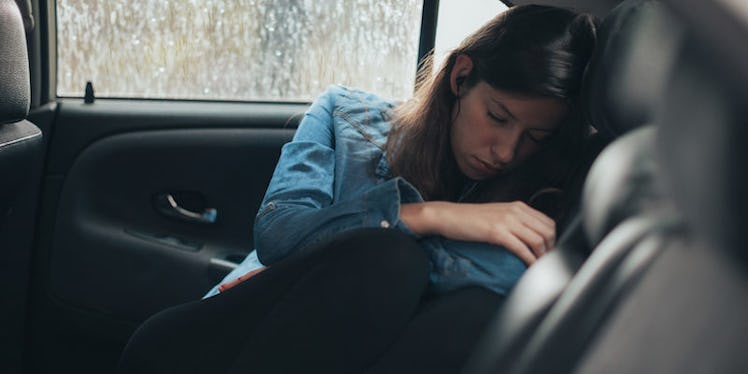
Carcolepsy: The Science Behind Why People Instantly Pass Out In The Car
I’ll always be envious of those people who are capable of passing out instantly in a car the second the wheels start moving.
For me, it’s never been that easy. If I’m in the car for a seven-hour ride, you can bet I’m awake for all seven of them -- staring out the window, watching the clock tick.
It’s miserable. And it has nothing to do with being tired or not either, because trust me: I’m always tired.
Yet whenever I’m in the car -- or a plane, too, for that matter -- I simply can’t get myself to sleep, no matter how many sheep I try to count along the way.
I’ve tried it all, too. I’ve pulled all-nighters on the days leading up to some of my trips. I’ve stayed away from coffee during days of travel. Nothing seems to work.
But with some of my friends, it’s as if they’re sleep deprived or something. For whatever reason, certain people are just able to jump in a car, close their eyes -- and boom -- next thing they know; they’re there. It’s as if it comes simply to them.
And I’m not even sure these people fully grasp how lucky they are to have been born with such a skill (and, yes, it is a skill).
I mean, think about it: By falling asleep during long trips, you all but eliminate the entire thing. There’s nothing more frustrating than having to sit in a stuffy car for a great deal of time, in anticipation of something fun.
Those types of car rides have the tendency of feeling a lot longer than they are in reality -- and in reality, they’re usually pretty long to begin with.
That said, when you’re able to sleep through them, all those hours you spend commuting are instead spent in a deep stage of REM.
Over time, I tried to figure out what specific components of long car rides were conducive to sleep and find a reason some people are able to sleep easier during long car rides than others.
Here’s what I found.
Car rides are 'kind of' comfortable.
A lot of what makes sleep possible has to deal with comfort.
Naturally, if you’re in the passenger or backseat of a car, you might not be super comfortable in a physical sense, but, given the fact that you’re not the one driving the car, there is a sense of comfort in knowing you’re not the one responsible for watching the road.
Some people, however, tend to get anxious when somebody else is holding the wheel.
Certain people feel obligated to stay awake and alert throughout entire trips because the feeling that they’re not fully in control can be unsettling.
Clearly, if somebody has the habit of “backseat driving,” that type of anxiety will prevent one from catching some Zs.
Car rides are monotonous and cause 'highway hypnosis.'
One popular scientific explanation for why people get tired after being in cars for long stretches revolves around the idea of “highway hypnosis.”
In his book, “Traffic and Transport Psychology: Theory and Application,” Geoffrey Underwood explains the phenomenon in depth.
According to Underwood, highway hypnosis is a trance-like state that one can experience from either driving or riding in a car for a long period of time.
While the theory revolves around a general feeling of tiredness, it’s actually not brought about by physical fatigue -- although the two are correlated.
Much of what goes into highway hypnosis has to deal with repetition and high predictability.
Because long car rides usually deal with the same few factors -- things like long monotonous roads, yellow and white painted lines and bright street lights -- it causes a large dip in our attentiveness.
Because we’re so used to seeing the same things, the entire process begins to feel automatic to an extent.
This, as Underwood explains, is what elicits a state of sleepiness -- although it’s not due to fatigue, necessarily.
Car rides maintain a consistent level of 'white noise.'
Another reason cars can create a positive environment for some people to sleep is the presence of white noise.
As defined by Colin Lecher of Popular Science, “white noise is a consistent noise that comes out evenly across all hearable frequencies,” but it’s also a common solution for some people who have issues falling asleep.
The reason white noise is beneficial for people with sleeping problems has to do with its ability to mask distracting sounds that might wake up lighter sleepers.
Lecher continues to explain how, “when a noise wakes you up in the night, it's not the noise itself that wakes you up, per se, but the sudden change or inconsistencies in noise that jar you.”
When driving in a car for a long time, white noise is constantly being emitted. Between the engine and the sound of driving on the open road -- cars create an environment full of white noise, one that’s perfect for lulling people into dreamland.